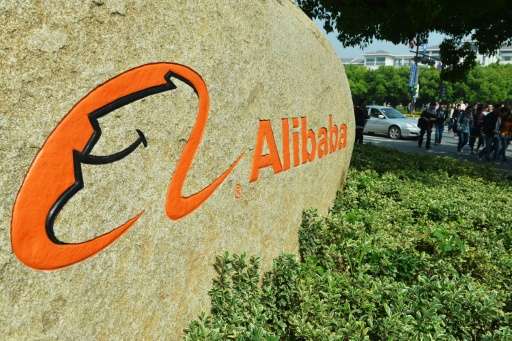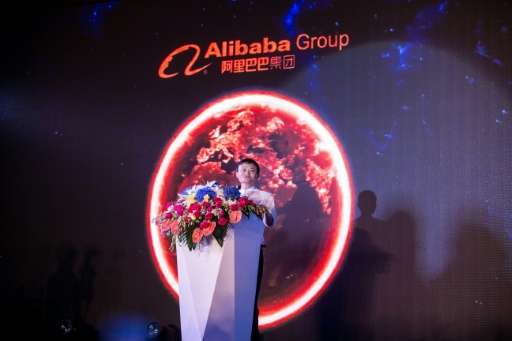Alibaba expands despite slowing China growth

Chinese online giant Alibaba on Tuesday posted robust quarterly results showing better-than-expected sales growth, allaying fears stemming from cooling in the world's second largest economy.
The upbeat results sparked a rally in Alibaba shares, which jumped 4.8 percent in early trade in New York to $80.03.
Transactions on the platforms of Chinese e-commerce giant surged 28 percent in the September quarter, according to the results released in China.
Alibaba's closely-watched gross merchandise volume (GMV)—a measure of value for online sales—was $112 billion (713 billion yuan) in the three months ended in September.
Net profit excluding investment gains surged 36 percent to $1.46 billion (9.25 billion yuan), the company said.
"We had a great quarter with strong growth across our core operating metrics," said chief executive Daniel Zhang.
"User engagement is very healthy. We are winning in mobile."
Alibaba, which last year launched a record initial public offering (IPO) in New York, has been dogged by concerns about slower growth in China and a sluggish pace of international expansion.
Zhang said the company is "making good progress" on the international front, working with partners in dozens of countries, particularly firms which want to reach Chinese consumers.
Within China, he said Alibaba is moving beyond the major cities to win customers "in the low tier cities and the rural areas."
After years of breakneck growth, China's Communist leaders are looking to transition the economy to a "new normal" of slower and more sustainable expansion driven by consumer demand rather than the investment and exports of the past.

Companies such as Alibaba—which is often compared to Amazon and eBay of the United States, and holds more than 90 percent of the consumer-to-consumer market in China—are crucial to the process.
But global markets have been roiled over concerns that the Asian giant's new economy is not growing quickly enough to make up for stagnation in older industries.
At one point this month, Alibaba's New York-listed stock had fallen nearly 40 percent from its peak reached a year ago shortly after its IPO.
China logged its worst economic performance since the global financial crisis in the third quarter, with gross domestic product rising just 6.9 percent—its lowest level in six years.
In response the government last week cut interest rates for the sixth time since November in a bid to stimulate expansion.
"Alibaba's markets in first- and second-tier, as well as third-tier cities are now saturated and facing fierce competition from other e-commerce providers," Zhang Yi, chief executive of consultancy iiMedia Research Group, told AFP before the results were released.
"Consumption is slowing down because the economic downturn has affected people's salary levels," he said.
Revenue beats expectations
Alibaba's Taobao platform dominates the consumer-to-consumer market, while its Tmall platform is believed to command more than half the Chinese market for business-to-consumer transactions.
The company said it had 386 million annual active buyers on its China retail marketplaces at the end of September, up 19 million from the end of June.
Revenue in the September quarter rose 32 percent year-on-year to $3.49 billion (22.17 billion yuan), Alibaba said, beating expectations for 21.3 billion yuan.
Another positive surprise came from cloud computing, with revenues up 128 percent to $102 million (649 million yuan).
"On first glance, we view these results as positive and a relief" amid expectations of weakening, said Barclays analyst Alicia Yap.
Analysts said Alibaba might perform even better in the current quarter with the inclusion of the November 11 shopping festival—China's biggest online shopping day, which last year exceeded the combined value of Thanksgiving Day, Black Friday and Cyber Monday in the United States.
"The shopping festival is more international this year with more high-end producers. But it still faces pressure as growth of e-commerce decelerates and the larger environment for e-commerce weakens," Guotai Junan Securities analyst Ray Zhao told AFP.
With deep pockets, Alibaba is making a string of acquisitions as it tries to develop beyond its traditional transaction platforms into a broader Internet company.
Earlier this month it made a multibillion-dollar offer to buy the outstanding shares of online video company Youku Tudou, China's equivalent of YouTube.
© 2015 AFP

















